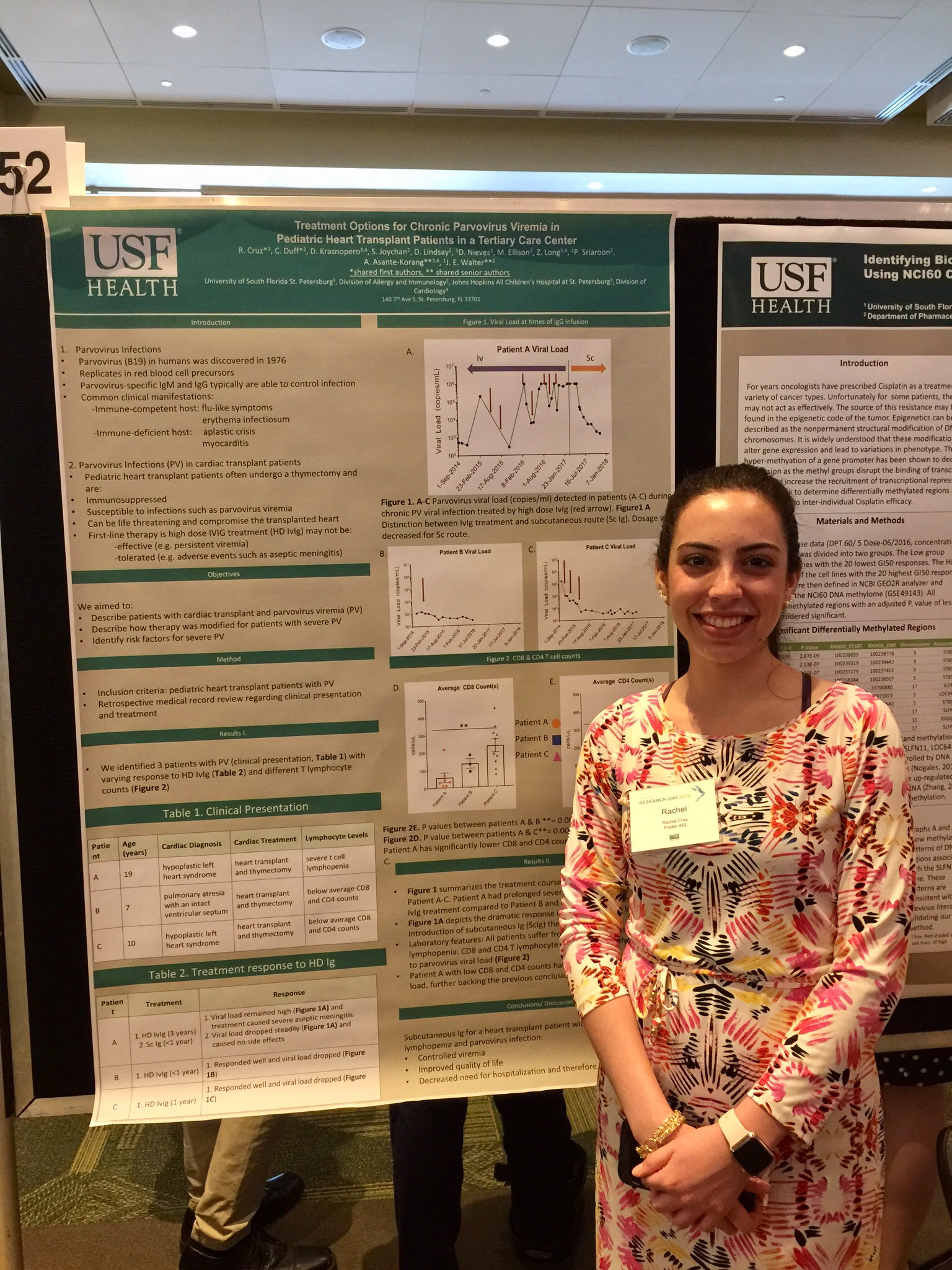Above photo: Freshman biology major Rachel Cruz’ research, presented at USF Tampa’s Health Research Day, could introduce new medical treatment possibilities. Courtesy of Rachel Cruz
By Delaney Brown
Rachel Cruz’s research is a mouthful: “Treatment options for chronic parvovirus viremia in pediatric heart transplant patients in a tertiary care center.”
The young researcher doesn’t miss a beat when discussing the ins and outs of a treatment she’s helping to bring to the medical world but can’t yet perform herself.
The freshman biology major spent the past year working on a clinical case study that hopes to make additional treatment options a reality for heart transplant patients who struggle with post-surgery complications.
The 18-year-old worked alongside Dr. Jolan Walter, division head of allergy and immunology at USF, at the Children’s Research Institute. While she can’t directly work on patients yet, Cruz’s analysis of viral loads, or the amount of HIV in a patient’s blood, played a vital role in the study.
Cruz compiles data collected before and after treatment to track how the patient’s immune system system responds to treatment. Tracking the data helps Cruz and other researchers introduce new treatment possibilities to the medical world.
With the help of Student Government special funding, Cruz will be the only undergraduate student presenting research at the 2018 meeting of the Clinical Immunology Society in Ontario, Canada.
“The idea is to promote the research in different places and get more research patients in different areas,” Cruz said. “Ultimately we’re trying to get a medical writer to publish this so that other medical institutions can use this treatment on patients.”
When a patient receives a heart transplant, the doctor has to remove the thymus, which is where T cells that fight infections mature. When a baby has a transplant, those T cells have barely matured before the thymus is removed, so they don’t have a negative reaction and reject the donor heart.
It’s this lack of mature T cells that leaves heart transplant patients susceptible to disease.
Usually patients recover well after having antibodies from another person introduced through IV, but for one patient, the standard treatment just wasn’t working.
“At the time that Dr. Walter started working with the patient, he was being hospitalized every few days,” Cruz said.
The patient’s T-cell count was simply too low to fight off infection. After each IV treatment, the viral load would drop slightly before climbing back up to where it started.
It was only after Dr. Walter decided to try out an untested treatment that patient started to respond. Instead of trying to jumpstart the patient’s immune system through IV, the doctor decided to try injecting the antibodies into the patient’s tissue rather than his veins.
Before treatment, the patient’s viral load was over one million. After treatment, it dropped down to one thousand.
“Injecting the antibodies into the tissue helped to slow down their release into the body,” Cruz said. “We’re still not sure exactly why this treatment helped the patient, but it did.”
“I’m so happy that I’m so young and already learning about this,” Cruz said.
A member of the honors program, Cruz spends what little time she has between lectures and labs at the hospital. She’s driven and wants to be a cardiothoracic surgeon one day.
“I always knew that I wanted to practice medicine,” Cruz said. “For a while I wondered if I felt like I had to be since my mom’s a nurse practitioner and my dad works at Tampa General, but my mom would’ve been just as happy if I were an artist.”
But being an artist didn’t call to Cruz like medicine did. When she was a junior in high school she helped her aunt, an OBGYN in Cuba, deliver a baby after spending a night in rotation.
“There was a woman giving birth and my aunt literally told me to scrub in. I remember vividly putting on the gloves, there was the supplies for the syringe and the nurse was just looking at me waiting for me to do something,” Cruz said. “Afterward I felt like I was going to throw up. It was just like ‘holy shit I love this.’ I could’ve stayed for weeks.”
Cruz hopes to share her passion for medicine with other students at USF St. Petersburg.
“I’m blessed because both my parents work in medicine,” Cruz said.
She knows that not every student is that lucky.
“(Finding internships is) all connections and perfect timing. I feel like so many people who come to USFSP from other locations have no opportunities.” Cruz said. “The resources we have on campus for pre-med students are scarce.”
Although USF St. Petersburg is located just down the street from All Children’s Hospital, named a top 50 children’s hospital by the U.S. News and World Report, its medical research pales in comparison to USF Tampa’s.
“We have a lot of marine and environmental research, but we don’t really have anything in medicine. It’d be nice to get this new dimension added to our image,” Cruz said.
Cruz hopes that by presenting at major conferences like the one in Canada, she’ll be able to bring more money and research opportunities to the waterfront campus.
“I want to promote USFSP,” she said. “I want to bring research to this campus and get students involved, and show that USFSP students are of a high caliber and equally to, if not better than, Tampa.”



